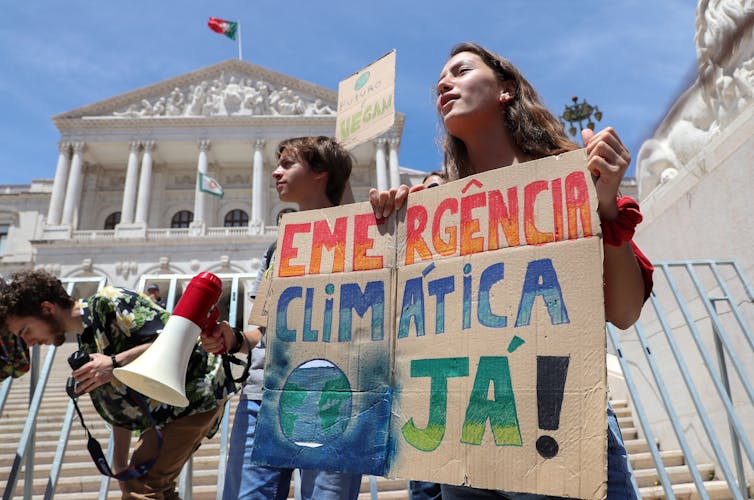Sam Varvastian, Cardiff University
The European Court of Human Rights finally has the opportunity to take on climate change. And it is taking it seriously, thanks to a group of 8 to 21-year-olds.

In September 2020, four children and two young adults from Portugal – all witness to the extreme heat and wildfires that have ravaged their home region – submitted a historic complaint to the European Court of Human Rights (ECHR), the top institution dealing with human rights violations in Europe. Their complaint is against 33 European countries.
In a nutshell, the plaintiffs claim that they face unprecedented risks to their lives and livelihoods and accuse the defendants of contributing to climate change and failing to take any effective measures against it. This, the plaintffs say, violates their rights to life, privacy and non-discrimination under the European Convention on Human Rights. On November 30, the ECHR made headlines by asking the defendant countries to respond to the complaint.
A wave of climate action
This is just one recent instance in a growing global wave of high-profile climate cases against governments around the world. Over the past 12 months, top courts in the Netherlands, Ireland, Switzerland, and Norway have all had to deal with rights-based climate cases. A similar case against the European Union is also currently pending in the EU Court of Justice. And the ECHR itself has to deal with another climate case, this time brought by a group of elderly Swiss women against the government of Switzerland.
But the Portuguese young people’s climate case takes things to a completely new level. The magnitude of their complaint is unprecedented in that it goes after some of the world’s largest greenhouse gas emitters, including France, Germany, Italy, Poland, Russia, Turkey and the UK. The stakes are very high. But so are the risks.
The ECHR normally considers only those complaints that were previously brought before national courts. This is the so-called “exhaustion of domestic remedies” admissibility criterion, set in Article 35.1 of the European Convention on Human Rights. But in this case, the plaintiffs filed their complaint directly to the ECHR without first going through the Portuguese national courts.
The Portuguese young people argue that the 33 countries have shared international responsibility for contributing to climate change, and going through a lengthy and costly litigation in national courts is not the appropriate avenue. The nature of their complaint is much closer to the transnational action by a group of children, including Greta Thunberg, currently pending before the United Nations Committee on the Rights of the Child.
A priority case
So, what does the ECHR’s November 30 announcement really mean? Quite a lot. First, by not immediately tossing out the case as inadmissible, the court has indicated its potential willingness to consider its merits. This is significant – only a small percentage of complaints to the ECHR make it to this stage. But not only that. The court also announced that it will deal with the case as a matter of priority according to Article 41 of the Rules of the Court:
In determining the order in which cases are to be dealt with, the Court shall have regard to the importance and urgency of the issues raised on the basis of criteria fixed by it. The Chamber, or its President, may, however, derogate from these criteria so as to give priority to a particular application.
The fact that the ECHR considers its first climate case to be so important and urgent as to require the fast-track procedure is quite telling. As is the fact that in its communication, the court went beyond the complaint by requesting the defendant countries also provide information on the potential violations of the right not to be subjected to torture or to inhuman or degrading treatment, and of the right to property.

Courts all around the world have been inclining towards greater consideration of climate change in their cases for some time now. Some of the most recent wins include:
- An order by the Irish supreme court in July, quashing a toothless national climate change mitigation plan.
- A ruling by the New South Wales Land and Environment Court in Australia, requesting expert testimony on climate change in a case brought by bushfire survivors against the environmental protection authrities.
- A ruling by Canada’s Superior Court of Justice, allowing a children’s case against the province of Ontario’s weak emissions reduction targets to proceed.
- A November 19 order of Conseil d’État – the French Supreme Administrative Court – giving the government three months to justify the achievability of the country’s commitments to reduce emissions.
In their complaint to the ECHR, the Portuguese young people referred to the 2019 UN Production Gap Report, measuring the discrepancy between the Paris Agreement’s 1.5°C warming goal and countries’ planned production of fossil fuels.
Just two days after the ECHR announcement, the 2020 edition was published. The latest report confirms that the world is nowhere near being on track to achieving the critical transition from fossil fuels that would prevent disastrous climate change. It may well be that the fate of these plaintiffs now rests in the hands of the ECHR.
Sam Varvastian, PhD Researcher, Cardiff University
This article is republished from The Conversation under a Creative Commons license. Read the original article.












